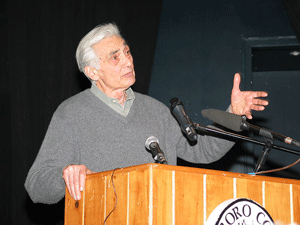
Photo: Wikimedia Commons
Twelve years after name-dropping Howard Zinn in Good Will Hunting, Matt Damon was back at it on Sunday with the world premiere of his spoken- word adaptation of Zinn’s A People’s History of the United States. For the production, which aired on the History Channel, Damon assembled a lineup of celebrity all-stars, including Bruce Springsteen, Bob Dylan, Lupe Fiasco, and Glenn Beck-adversary Viggo Mortensen. He also recruited Benjamin Bratt, which just goes to show that no matter what the Founders told you, all celebrities are not created equal.
There are some bright spots—Dylan and Ry Cooder’s performance of Woody Guthrie, for instance—but structurally, the program is a bit of a mess. After a while, the recitation from the journals of slaves, labor leaders, and women’s suffragists (but no Mother Jones!) that comprises the bulk of the program starts to blur into an overbearingly earnest version of that early YouTube classic, “The Evolution of Dance.”
But the biggest problem with The People Speak isn’t the people who speak; it’s Howard Zinn. Damon’s tribute to his childhood neighbor Zinn is strung along with voice-overs from the historian himself, informing us that the Constitution was a tool of peasant-loathing aristocrats, that the Civil War was fought for the pleasure of Northern business interests (Lincoln was just a pawn), and World War II was a waste of everyone’s time.
A People’s History will always be worth reading as a counterweight to more conventional texts—if new generations are introduced to Chief Joseph and Sojourner Truth as a result of Zinn’s writing, then he has achieved a noble goal. But for a work so deeply ingrained in the progressive consciousness, bursting with stories of individuals and movements who pushed the nation to live up to its unfulfilled promise, Zinn’s overarching thesis of American oppression seems beyond cynical; it’s downright conspiratorial.













